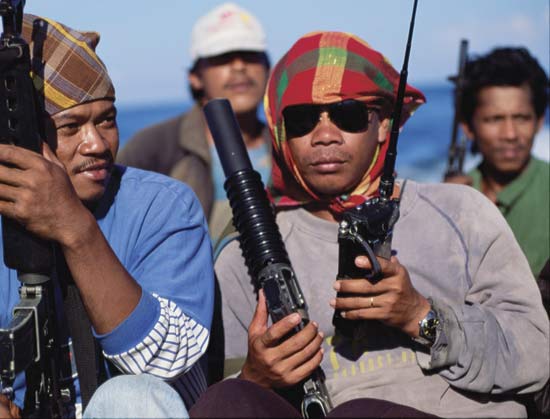
By Conor Godfrey
Over the past several days, news that French naval forces had captured ten pirate vessels coincided with reports of pirates seizing new ships and demanding hefty ransoms.
To Susie-Q public, piracy seems like a bad joke. Even the moderately well informed news consumer tends to picture a black Johnny Depp swilling rum on an African beach and blowing his hard earned ransom money on a few good nights in Margaritaville.
People ask how the world’s great powers let a few amateurs with motorboats push them around?
This image was cemented when American snipers killed three pirates in the Hollywood style rescue of Captain Richard Phillips. I could hear people around me thinking, “that’s right matey, look what happened when Uncle Sam got serious!”
However, the reality of modern piracy is complicated, expensive, and difficult to stamp out.
First some answers to the simple questions:
Why is it so hard to catch them?
Well, the twenty-odd warships on patrol cannot possibly cover the 1.1 million miles of ocean known as the Gulf of Aden. Pirates are also eschewing the heavily patrolled coastline and seizing ships up to 1,000 miles from the coast.
On the investigative side, the Somali economy runs almost entirely on cash, making it difficult to freeze pirate assets or follow the money back to the real movers and shakers.
Furthermore, the lack of an effective Somali government gives rise to a tragedy of the commons—who wants to foot the bill for stamping out piracy that effects everyone? (Sounds a bit like the Copenhagen Summit.)
How serious is the problem?
About 3.3 million barrels of oil pass through the Gulf of Aden every day. In any given year 20,000-30,000 ships use the Gulf to pass through the strait of Bab el-Mandab and onto the Suez Canal.
Where is the closest detour you ask? A mere 3,000 miles both ways around the Cape of Good hope.
The estimated 30 million dollars the pirates claimed in ransoms during 2008 accounts for only a tiny fraction of the overall cost to the global economy.
Rising insurance premiums, the cost of armed escorts, and fuel for detours constitute significant transaction costs for companies plying their trade in the Gulf of Aden.
The resurgence of piracy also says something important about the global system and Africa’s place in it.
Along with all the benefits of globalization came one significant drawback—the international system is now much easier to disrupt and those disruptions ripple further than ever before.
Buccaneers in Somalia with a few AK47s and the odd RPG can hurt the global economy to the tune of billions of dollars. (Estimates vary widely between 1 and 16 billion dollars annually.)
19 hijackers with box cutters can change the world.
Drug cartels based in South America can topple West African governments.
Bad dept in one sector of one country’s real estate market can trigger a cascade of financial failures all over the world. (Indulge the simplification to illustrate the point.)
Poverty and inequality unfortunately make Africa a likely breeding ground for such disruptors—be they pirates or pandemics.
While I have mixed feelings about globalization in general, I hope its benefits reach the underserved parts of Africa before those places protest their neglect by launching the next global menace.
Related Reading: Piracy Map
I like America’s “Hollywood style” of dealing with these pirate thieves/murderers/terrorists. That said, I am sure we can up with a sensible solution… several, in fact. Our best minds are capable of dealing with this. I imagine that the USA along with other civilized countries are addressing this issue right now. Sign me up.